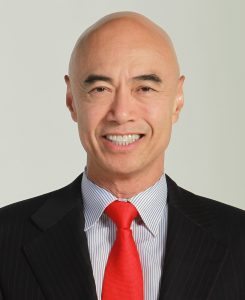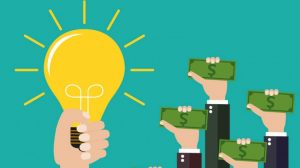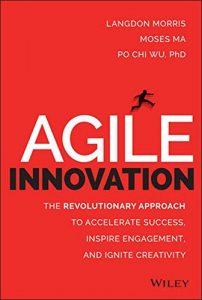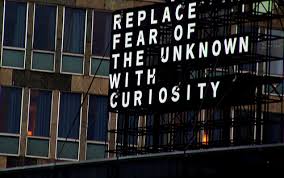Innovation and the Complexity of Being Human: An Interview with Dr. Po Chi Wu

“How can we evolve as a society to be able to see patterns that include many more dots, different patterns, so that we can interpret a more comprehensive vision that benefits us and others at the same time? We must have this as a definite intention, a drive to learn something new that will allow us to adapt to the uncertain future,” Dr. Po Chi Wu writes in his article, “Connecting the (Hidden) Dots.” Dr. Wu teaches innovation and entrepreneurship at the School of Business and Management and the School of Engineering at the Hong Kong University of Science and Technology. He also co-authored the book “Agile Innovation” and has decades of experience as a former venture capitalist and entrepreneur in Silicon Valley. Dr. Wu gave a TEDxHongKong talk on curiosity and believes that only by embracing challenges, our own complexity and paradoxes, can we begin to find clarity and freedom. His article discusses this and cognitive bias, which he describes as a preference to only see and include dots that already make sense to us. Below, Dr. Wu has shared insight about his experience with entrepreneurship and how opening our minds to more dots and new patterns can help us embrace challenge, seek out innovation, and transform not only ourselves but the world. Make sure to check out his full article and blog site for more information!
Dr. Wu, thank you for taking time out of your busy schedule to answer several questions for us! You teach innovation and entrepreneurship at the Hong Kong University of Science and Technology. What do you challenge your students with, and how have they in return challenged you?
 I am very grateful to HKUST for giving me the opportunity to learn so much – while sharing my experience with and being challenged by students including freshmen, MBA/MSc, and senior executives in companies. This has been truly life-changing for me! I am now affiliated with the Sutardja Center for Entrepreneurship & Technology at UC Berkeley and will be teaching there this Fall.
I am very grateful to HKUST for giving me the opportunity to learn so much – while sharing my experience with and being challenged by students including freshmen, MBA/MSc, and senior executives in companies. This has been truly life-changing for me! I am now affiliated with the Sutardja Center for Entrepreneurship & Technology at UC Berkeley and will be teaching there this Fall.
My challenge to students: “By the end of the semester, if you do the work, I can promise that you will have new brain cells and new neural connections in your brain! What will you choose to do with them?”
A fundamental drive of innovators/entrepreneurs is that they challenge themselves to explore “what is unknown”. What they realize and delight in is that every day is full of “unknowns,” unexpected possibilities, interactions and observations. Most of us choose to ignore those “data points” as outliers to our familiar daily routines. Why do we do this? How can we grow if we don’t constantly chase what we don’t know? All of us resist change because of various fears. However, when we can acknowledge our discomfort, then re-frame the concept of “challenge” as “opportunity,” that can be so liberating! This huge shift in mindset takes a lot of energy to achieve and requires seeing the world from fresh perspectives.
The challenge students present to me, mostly unspoken, is that I have to learn how to communicate much more effectively, in new and creative ways, than I had ever imagined I could. Consequently, I discovered a real passion for sharing through story-telling, for supporting young people in their personal and professional journeys to become happier, more creative, more productive whatever their choices of studies and career. I am grateful for them inspiring me! An unexpected consequence is that I have been honored to be invited as a speaker at several TEDxHongKong and TEDxPearlRiver events. The title of one of those talks was “Who Killed Curiosity?” That is an interesting follow-on to your recent interview with Dr. Liz Alexander.
While you are not a trained psychologist, your decades of work as an investor and with startup teams has given you unique insight into how people think and behave. How has this experience shaped your thinking and approach to teaching and communicating with Millennials?
 Most people think of venture capital as a financial business. A VC invests other people’s money and seeks to achieve exceptional returns on investment measured in multiples and not percentage points. What do think the venture industry has in common with the game of baseball? A professional baseball player who can hit 3 of 10 pitches when he is at bat is considered outstanding. But that means he misses 7 of 10 pitches. Similarly, historical statistics show the majority of a VC’s investment decisions are wrong, and result in total losses of invested capital! To save a VC fund, 20-30% of their investments must achieve 10-50X returns to make up for the losses of the other 70%. Doesn’t this mean that VCs have more experience with failure than with success? VCs study failure, to figure out how to get stronger, better as investors and as people. They embrace failure as an essential path to learning.
Most people think of venture capital as a financial business. A VC invests other people’s money and seeks to achieve exceptional returns on investment measured in multiples and not percentage points. What do think the venture industry has in common with the game of baseball? A professional baseball player who can hit 3 of 10 pitches when he is at bat is considered outstanding. But that means he misses 7 of 10 pitches. Similarly, historical statistics show the majority of a VC’s investment decisions are wrong, and result in total losses of invested capital! To save a VC fund, 20-30% of their investments must achieve 10-50X returns to make up for the losses of the other 70%. Doesn’t this mean that VCs have more experience with failure than with success? VCs study failure, to figure out how to get stronger, better as investors and as people. They embrace failure as an essential path to learning.
The VC model, especially as practiced in Silicon Valley, emphasizes “pivoting”, constantly tweaking a business model or a product/service, to find something that can be massively successful at scale. There’s a saying: “If you don’t fail, you aren’t stretching enough, you are not learning as much as you possibly can.” How do people live with this kind of mindset, not just once or twice, but for a lifetime? One of my favorite classes is “Lessons from Failure.”
Hundreds of business and self-help books and millions of dollars are invested in programs every year by people seeking success. While these suggestions are helpful, the truth of life is harder to accept – until we challenge ourselves, push ourselves through failure after failure, we cannot learn how to be truly successful.
Millennials are impatient to learn, more through direct experience than through conventional formal education. My interpretation of this observation is that I, as an instructor, must focus on what students can learn, and not on what I can teach. My role has three parts: (1) share my love of learning and provide tools, (2) challenge students through questions, (3) since they are doing the work of learning, I must provide meaningful feedback, often in the form of further questions. In academia, this emphasis on context rather than content is a radical notion. The hoped-for outcome is that most students will respond by discovering new aspects of who they are. As a mentor/coach, I am just a guide, providing “context and perspective” rather than “giving expert advice.” That kind of learning they can’t acquire through their own research. I don’t set expectations and rarely offer value judgments. Each person will grow at his or her own pace, in response to whatever they choose to encounter, along a journey he or she will have to discover or create on his/her own. All of us have to be innovators and “entrepreneurs” in the sense of taking charge of our lives.
You wrote on the book “Agile Innovation: The Revolutionary Approach to Accelerate Success, Inspire Engagement, and Ignite Creativity?” Can you share a bit about the ideas behind it and who it is written for?
 My co-authors are thought leaders in different aspects of innovation. Langdon Morris, the lead author, is particularly experienced as a consultant and educator, advising Fortune 500 companies and governments in ways to grow through innovation. Moses Ma, our third co-author, has been a creative tech genius for several decades. When we met just a few years ago, we realized that we bring complementary pieces of the puzzle, that our differences could be melded together to form a new way to describe the journey of innovation. Basically, we found that the principles of agile software development, well recognized as particularly effective in the creation of novel software, can describe the process of innovation. In the context of an established corporation, innovation will be possible only when accompanied by significant changes in mindset, organizational culture and structure.
My co-authors are thought leaders in different aspects of innovation. Langdon Morris, the lead author, is particularly experienced as a consultant and educator, advising Fortune 500 companies and governments in ways to grow through innovation. Moses Ma, our third co-author, has been a creative tech genius for several decades. When we met just a few years ago, we realized that we bring complementary pieces of the puzzle, that our differences could be melded together to form a new way to describe the journey of innovation. Basically, we found that the principles of agile software development, well recognized as particularly effective in the creation of novel software, can describe the process of innovation. In the context of an established corporation, innovation will be possible only when accompanied by significant changes in mindset, organizational culture and structure.
The book is written for a broad audience, and will benefit anyone curious enough to read it thoughtfully. Corporate executives will find guidance and support to discover effective ways to grow existing and new business opportunities. Young entrepreneurs will find disciplined, systematic processes that will help them avoid some of the dangers of following outdated business thinking. Our hope is that Millennials and students can find inspiration and hope that meaningful change is possible.
In your article, you encourage society to evolve to see different patterns and patterns with more dots in order to adapt to the uncertainties of the future and interpret a more comprehensive vision. What do you think might be some steps to doing this?
 To develop leadership skills, your life principles must reflect the Entrepreneurial Mindset:
To develop leadership skills, your life principles must reflect the Entrepreneurial Mindset:
1) Seek opportunities (embrace challenges)
2) Take initiative (action)
3) Be accountable
4) Deliver effective, practical outcomes
According to IBM’s bi-annual CEO Survey, in which some 2,500 chief executives from all over the world are asked to list the most important and desirable characteristics among their leaders, every kind of organization, including non-profits, and government agencies, is desperately searching for people who show this kind of potential.
As we accept the responsibility (and opportunity) of creating our lives and new businesses, we have to temper our fear of the unknown (and one another). We must believe in the “abundance mentality,” that we either already have the knowledge and resources to solve all the challenges that face us, or that we have the capability to discover and invent new technology that we need. We cannot afford to have irrational fears – that only leads to weakness, not strength.
We have to believe in the power of the scientific method, i.e., to observe (dispassionately and objectively), design hypotheses to test assumptions, assess outcomes and modify assumptions in response to new data points of knowledge. Iterate the process over and over. Scientific truth exists because it can be tested! Our actions reflect the assumptions we believe. At any given moment, some of our beliefs are rational and some are not so rational. By the way, we must honor our “non-rational” side – that includes creativity and empathy, as well as emotion. To benefit fully from the complexity of being human, we must maintain an open mind, extreme curiosity, and keep asking critical questions.
The concept of “embracing unknowns” also means honestly accepting the limits of our knowledge and ability. But those limits can be temporary! The fact of “not knowing enough” does not have to prevent us from doing the best we can. We must have the courage to act, to find or create more data points, to inspire the vision of new patterns. We must have the integrity to acknowledge and correct our mistakes.
Where do you anticipate the future of innovation and entrepreneurship heading, especially if we are ever able to connect the hidden dots?
Alan Kay, one of the pioneers of the PC era, said: “The best way to predict the future is to invent it.”
The exponential growth of new knowledge, new technologies, suggests that non-linear projections of the future are possible. New tools, new power, always have a dark side, unforeseen and unintended consequences, as well as bring huge benefits. The number of new data points, including “hidden dots,” is already overwhelming and will only become more so. As new patterns emerge, there is no limit to what can be achieved, for good and for evil. For example, in our hyper-connected Internet culture, look at cybersecurity issues today!
 Virtually every industry, every kind of organization in the world, is changing or being forced to change. Are innovation and entrepreneurship driving this change? Will they become more important, as a result of this direction? Pessimists, those who fear change, see the world as a glass half-empty. Optimists, those who embrace change, see the world as a glass half-full of opportunities. The world has never been and may never be perfect for everyone. If you’re not happy with who you are and what you are doing, how will you respond to the challenge?
Virtually every industry, every kind of organization in the world, is changing or being forced to change. Are innovation and entrepreneurship driving this change? Will they become more important, as a result of this direction? Pessimists, those who fear change, see the world as a glass half-empty. Optimists, those who embrace change, see the world as a glass half-full of opportunities. The world has never been and may never be perfect for everyone. If you’re not happy with who you are and what you are doing, how will you respond to the challenge?
If you choose to take action, to drive some change yourself, you will perceive patterns that suggest new possibilities. Then you will be part of the energy of innovation and entrepreneurship.
Connecting the hidden dots on a large scale brings to mind government and politics. Do you think turning the light bulb on for a large population could ever be objective and not self-benefiting?
Although governments must serve the people, the challenge for leaders is to balance their own self-interest, e.g., desire for power, with the interests of society. Unfortunately, even when political structures are “democratic,” i.e., subject to popular vote (or recall), what is truly beneficial for people (society, the environment), may not be reflected by policies of the leadership. The current situation in the US is a fascinating contrast with that in China. On the one hand, the leadership, the Chinese Communist Party, wants to embrace powerful new technologies that will give them better and more precise control over their economy. At the same time, those technologies require and generate huge amounts of data that need to be shared for effective execution, but the leadership doesn’t want that information to be widely available because disclosure might threaten their power. What a conundrum! They are painfully aware that, as more information, more dots, become known, the more easily critics can identify flaws or mistakes.
Across large populations, the levels of education and awareness are unavoidably mixed. Even if it were possible to provide every citizen with all the relevant and accurate data points (“dots”), multiple interpretations and points of view would exist. Where one group of people experiences benefit as a result of a policy, e.g., tax reduction, another group may face hardship. Factory automation helps manufacturers be more profitable, and factory workers are laid off. This is called progress.
For example, consider the debate over climate change. Is it based on honest, scientific inquiry? What assumptions need to be tested? What patterns emerge from the data? Who can we believe? Without a grounding in some “generally accepted truth,” it is impossible to design any policies that will be meaningful. We can’t fool ourselves into thinking that the only truth is what we already believe or preach. We have to acknowledge the obvious fact that our knowledge is very limited – of our human bodies, of how the Earth’s climate systems work, of the meaning of life itself. In this situation, even if we may not have enough data points for definitive understanding, inaction carries a risk that borders on being immoral. Taking action that will have positive consequences (more data points) has to be the path to learning and improvement.
To survive, society must adopt this mindset of learning and experimenting. Since society will always be heterogeneous, we will also need to embrace our diversity, and learn to interact with empathy.
As you mention, voting is a reflection of common understanding, yet simultaneously requires individual input – an interesting dichotomy. How do you think we can bridge personal philosophies and value systems with a greater understanding ideally shared by society as a whole?
I don’t have a direct answer to your question. I do think this is an important question, one that begs serious thought and exploration. For individuals, and as a society, many questions need to be raised and diverse points of view must be integrated into some kind of common understanding. Basic assumptions need to be reassessed in the new context of global change and tested, over and over. Much of our thinking and beliefs are based on outdated assumptions, many of which we are rarely even aware. We need to remove all these filters and see what is going on clearly and objectively.
Life, or rather, Nature, is basically unfair, at least from a secular point of view. Members of a species who are physically strong have a huge advantage, yet, when faced with new challenges, agility and adaptability have more power to enable survival. Look what happened to dinosaurs. The intentions of any political system are: (1) to govern, to establish and maintain stability in society, and (2) to grow the economic power of the country. In political systems, the democratic principle is based on the assumption that a majority consensus can be accepted by the population as a whole, at least until another vote is taken. Fairness in the political context is defined as “good as determined by a majority vote.” By virtue of numbers, the majority voice is endowed with strength, the power to decide. But – what happens when the voice reflects only an active minority, while the majority of the population is actually silent and doesn’t vote? How can this process lead to the best outcome for all of society? Fairness can only be achieved when people care about the concept. What will constitute an “agile, adaptable” political system?
From history, it appears that political systems, like many aspects of human society, tend to alternate between periods of self-governance = “democracy” and some kind of authoritarian rule = (preferentially benign) “dictatorship”. The Greeks, who invented the concept of democracy, felt that 5,000 is the maximum size of a population that could effectively implement truly democratic principles. Is democracy scalable to 50 million, 500 million, 5 billion people? More people, more opinions, more differences, mean more potentially conflicting self-interest. What does a “majority opinion” even mean?
Here is an intriguing vision of the future. As humans become increasingly “cybernetic”, to the point where we can have neural implants that can access vast stores of common knowledge (think “Google Cloud”), will all of us finally have comparable levels of understanding? Will we be able to agree on what might benefit most of us, i.e., society at large? What is the dark side of this vision? Would we all become “mostly clones,” with just enough original creativity to be interesting? Or, will our systems, buildings, transportation, security, become so sophisticated that they will be self-governing, and immune to human intervention (and self-interest)? Who will program these intelligent systems and how? Even “artificial intelligence,” at least at its current stage of development, is founded on human assumptions, existing data points, and may be limited by current perspectives. Who decides on priorities and values to be preserved? The need for serious discussions about moral and ethical aspects is critical. Some of the most brilliant business leaders, like Bill Gates and Elon Musk, have underscored the urgency.
If you could give one piece of advice to Millennials and future generations, what would it be?
 Character matters. What are we seeing in the world today? Millennials, like every previous generation, struggle to make sense of the world they live in. They are more aware of the confusing diversity of how different cultures are evolving. What have they inherited? Sadly, the most prominent legacy seems to be mistrust. Isn’t hope for the future the most valuable legacy from one generation to the next? Isn’t a fundamental sense of trust in the accumulated knowledge and wisdom of our educational, business and government institutions necessary? How can we build on mistrust?
Character matters. What are we seeing in the world today? Millennials, like every previous generation, struggle to make sense of the world they live in. They are more aware of the confusing diversity of how different cultures are evolving. What have they inherited? Sadly, the most prominent legacy seems to be mistrust. Isn’t hope for the future the most valuable legacy from one generation to the next? Isn’t a fundamental sense of trust in the accumulated knowledge and wisdom of our educational, business and government institutions necessary? How can we build on mistrust?
Millennials (indeed all of us) need to believe in themselves, in the value of being human. Only by embracing their own complexity, their paradoxes, their conflicting beliefs, can they begin to understand the paths that will lead to clarity. Progress requires sacrifice and dedication of purpose. The same is true of freedom.
Unlike in earlier ages, simply mastering existing knowledge is now only a tiny first step toward survival in an unforeseeable future. Millennials must find their own way. Entrepreneurship is one such path. By embracing challenges, entrepreneurs have an amazing opportunity to transform and improve the world. They have access to and are developing new technologies, new tools that have unprecedented promise. Their interconnectedness is a new kind of power that they have not yet learned to harness. Isn’t this an exciting time?
Hope and courage – which comes first?
Dr. Wu, thanks for sharing your experience and insight! Indeed, we must look within ourselves for clarity and freedom. Can we overcome our tendency to close our minds off to the unknown, to the controversial? In order to embrace the complexity of what it means to be human, we must learn to do so for opening ourselves to creativity and innovation is essential to thrive in almost any aspect of life, from business ventures to democracy. What are your thoughts?





Responses